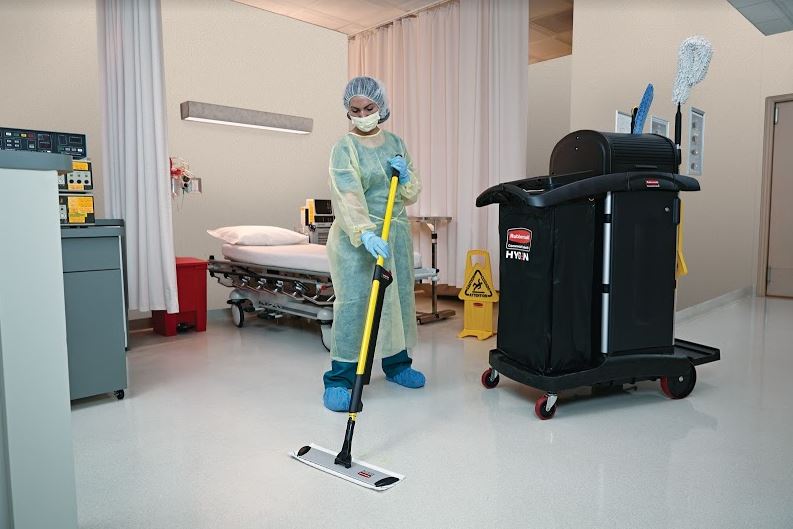
x
In the healthcare industry, one critical role often goes unnoticed: the hospital cleaner. These professionals work tirelessly to maintain a safe and hygienic environment in medical facilities, preventing infections and ensuring patient safety. This article takes a deep dive into the demanding yet rewarding job of hospital cleaners, highlighting their responsibilities and contributions to public health.

When entering a hospital, cleanliness is often the first thing people notice. However, beyond appearances, maintaining a sterile environment is vital for preventing the spread of infections. Hospital cleaners form the backbone of infection control strategies, ensuring that every surface, room, and piece of equipment is properly cleaned and disinfected. Their work directly reduces hospital-acquired infections (HAIs), which affect about 5% of hospitalized patients annually in the United States, according to the Centers for Disease Control and Prevention (CDC).
Unlike cleaning in other industries, hospital cleaning demands strict adherence to protocols. Every action is deliberate, from selecting the appropriate disinfectants to following specialized cleaning techniques. Hospital cleaners contribute significantly to patient recovery rates, staff safety, and overall public trust in healthcare institutions.
Hospital environments are diverse, from intensive care units (ICUs) to outpatient facilities, each requiring specific cleaning protocols. Cleaners must adapt to different settings, understanding the unique challenges and requirements of each. For instance, ICUs require more frequent and rigorous cleaning due to the vulnerability of patients and the high risk of infection transmission.
Working as a hospital cleaner requires more than just physical effort—it demands expertise. Many aspiring cleaners take a hospital cleaning course to learn about infection control, cleaning techniques, and safety protocols. These courses cover topics like:
Proper Use of Cleaning Agents: Understanding chemical compositions, appropriate dilutions, and application methods.
Infection Prevention: Learning how to identify and eliminate pathogens effectively.
PPE Usage: Training on the correct use of personal protective equipment to ensure safety while handling hazardous materials.
These courses are often available online or in-person and may be offered by hospital environmental services companies or specialized training institutions. Completing such training not only boosts employability but also ensures that cleaners can meet the high standards required in medical settings.
Additionally, certifications from recognized bodies can enhance a cleaner's credibility and job prospects. Certifications often require a combination of coursework and hands-on training, ensuring that candidates are well-prepared for the challenges of the job.
Hospital cleaners carry out a wide range of tasks that go beyond basic cleaning. Their responsibilities include:
Surgical Area Disinfection: Cleaning surgical rooms requires meticulous attention to detail. Hospital cleaners follow strict protocols to ensure that these sterile environments are free from contaminants.
Cleaning in hospitals involves more than just removing visible dirt. It is a two-step process:
Cleaning: The first step involves removing organic matter, such as dirt, blood, or bodily fluids, from surfaces. This is done using detergents and water to prepare the area for disinfection.
Disinfection: This step involves applying chemical agents to kill bacteria, viruses, and other pathogens. High-touch surfaces, including door handles, bed rails, and medical equipment, receive extra attention.
Modern hospital cleaning services are increasingly leveraging technology to enhance efficiency and effectiveness. Some of the latest innovations include:
Ultraviolet (UV) Disinfection: UV light systems are used to eliminate pathogens in hard-to-reach areas.
Electrostatic Sprayers: These sprayers evenly distribute disinfectants, ensuring comprehensive coverage.
Robotic Cleaners: Automated robots are being designed to clean and disinfect hospital floors autonomously.
These advancements are particularly useful in reducing HAIs and maintaining a safer environment for patients and staff.
Moreover, data-driven approaches are being adopted to track cleaning performance. Sensors and software can monitor cleaning activities and verify that all necessary tasks have been completed. This not only improves accountability but also helps optimize cleaning schedules and resource allocation.
The demand for hospital cleaners has risen significantly in recent years, driven by the increasing focus on infection control and the growth of healthcare facilities. Hospital cleaner job recruitment is often handled by hospital environmental services companies, which seek candidates with strong attention to detail and a commitment to hygiene standards.
Applying for a hospital cleaning job typically involves submitting a housekeeping application either online or in person. Candidates are often required to:
Provide a high school diploma or equivalent.
Pass a background check.
Complete on-the-job training or hold certification from a hospital cleaning course.
If you're searching for “housekeeping near me,” local hospitals or healthcare facilities are a good place to start. Many institutions have dedicated job portals where you can explore open positions.
The healthcare industry is one of the fastest-growing sectors in the U.S., leading to a steady demand for cleaning professionals. This growth provides job security and opportunities for advancement within the field.
Hospital cleaning is not without its challenges. Cleaners often face:
Exposure to Contaminants: Working with biohazard materials and infectious agents requires strict adherence to safety protocols.
Physical Demands: The job involves long hours of standing, bending, and lifting.
Emotional Strain: Being in a healthcare setting can be emotionally taxing, especially in critical care areas.
Despite these challenges, the job is deeply rewarding. Hospital cleaners take pride in knowing that their work directly contributes to saving lives. Many cleaners develop strong relationships with healthcare staff and gain a sense of fulfillment from being an integral part of the healthcare team.
Hospital cleaners often report high job satisfaction due to the meaningful impact of their work. Knowing that their efforts help prevent infections and promote healing provides a profound sense of purpose.
Hospital cleaners are the unsung heroes of healthcare, working tirelessly to ensure the safety of patients, staff, and visitors. Their role extends beyond basic housekeeping, encompassing specialized cleaning and infection control practices that are critical to public health. As healthcare continues to evolve, the demand for skilled cleaners will only grow, offering rewarding career opportunities for those who take pride in making a difference.